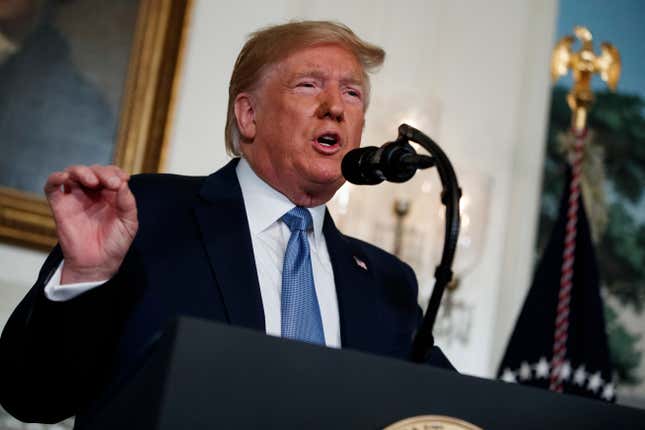
We have reached the point in American society where you can reliably predict the series of events that immediately follow a mass shooting. In 2019, you can set a clock to it: After the shock and scramble to understand what happened amid the chaotic perpetual loop of social media and cable news, we begin to learn: about the shooter, about the victims, about the demand for those in government to do something, anything, to make it stop.
Invariably, someone—most likely a lawmaker too compromised by donors and lobbyists to offer any more than hollow “thoughts and prayers,” or a pundit more interested in controversy and ratings than they are incisive commentary—will bring up video games as a dark cultural force enabling these horrible incidents. This time, the President joined their ranks, decrying the “gruesome and grisly video games that are now commonplace” when delivering remarks Monday morning about the back-to-back mass shootings in El Paso, Texas, and Dayton, Ohio over the weekend.
No one need waste any energy disproving this claim, from within games or without. There is scholarship and statistics that can be pointed to if someone is interested in learning more. The Supreme Court has also already weighed in. Short of that, expending energy defending the video game medium from disingenuous attacks only serves the interests of those who would prefer to not address the problem of American gun violence.
Video games will continue to be a scapegoat for disingenuous lawmakers and lobbyists for as long as a scapegoat is needed. And as long as gun violence remains a problem in America, a scapegoat will be needed. Every second spent defending video games from blame is a second not spent addressing the root causes of what’s become weekly massacres: a complete lack of sensible gun control, a government utterly disinterested in even entertaining the possibility of said gun control, or combating the racist and misogynist ideologies that fuel the men who massacre the innocent.
Give in to the urge to join the cultural debate about the non-existent role of video games in real-world violence, and you become a pawn, fuel for cable news segments that gun lobbyists and lawmakers would rather pontificate on instead of addressing the issues at hand. Remember that if you enjoy video games and live in America, then you have a horse in this race beyond the fate of your hobby, that the number of cities synonymous with tragedy is growing as the number of public spaces we think of as safe is shrinking. Remember that we are fast approaching the one year anniversary of a similar mass shooting at a Madden tournament. Remember that just one of these incidents, anywhere, is too many.
We often refer to the “gaming community” as a singular body, even if that’s not particularly true—video games and the people who play them are too large and diverse to be characterized in any one way. The issue of gun violence, however, is one that directly concerns everyone, and if there is in fact a community around the video game medium, then that community owes it to those around them to do their part, to add their voices to the many that demand change, that refuse to let hate fester in their darkest corners, that puts incessant, urgent pressure on our leaders and those that hold them accountable to do their damn jobs.
Video games don’t need defending. People do, and they’re dying. If we can stop this from happening—and other nations around the world have shown that we can—it is imperative that we try. Then we can worry about what the world thinks of video games.

